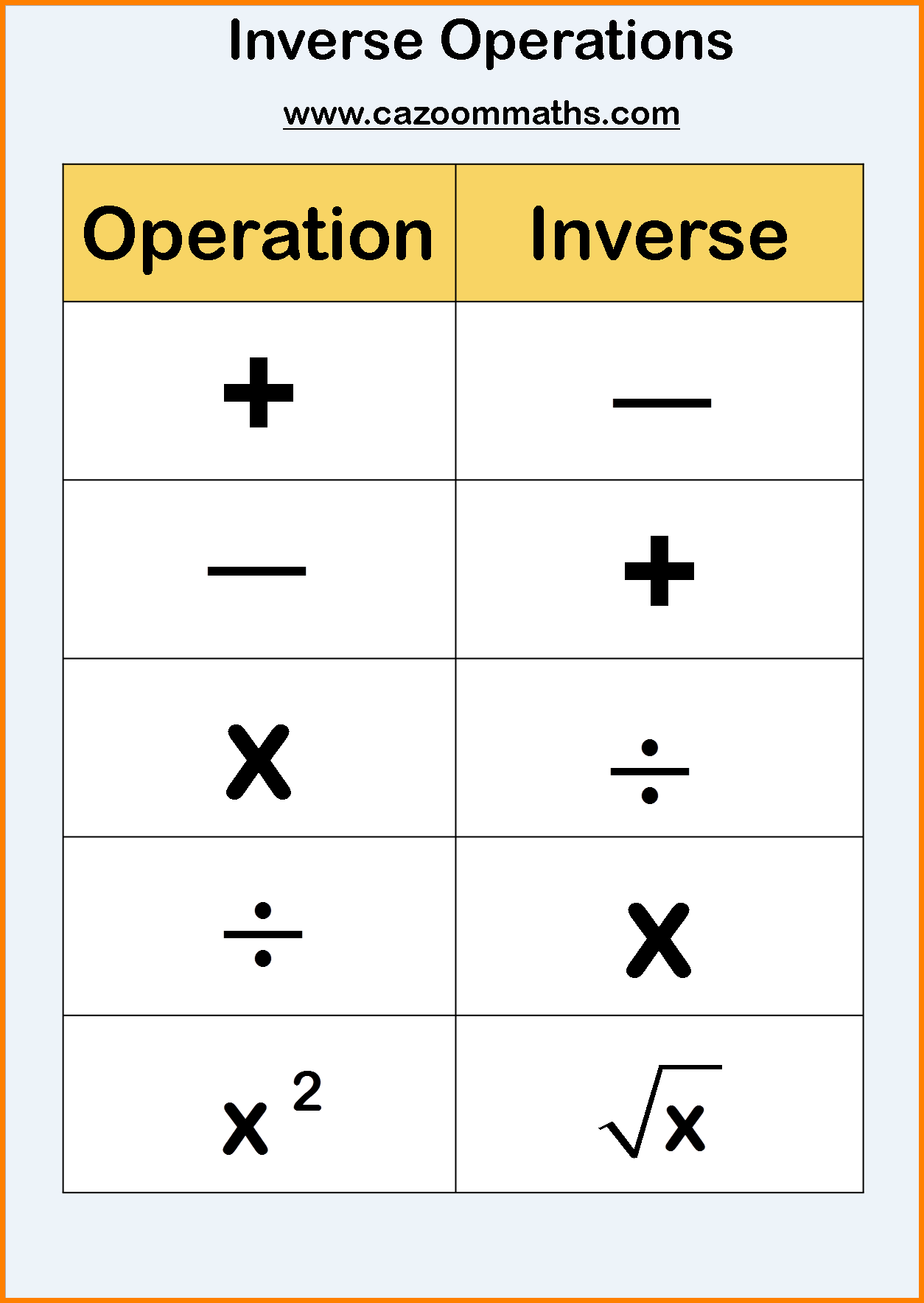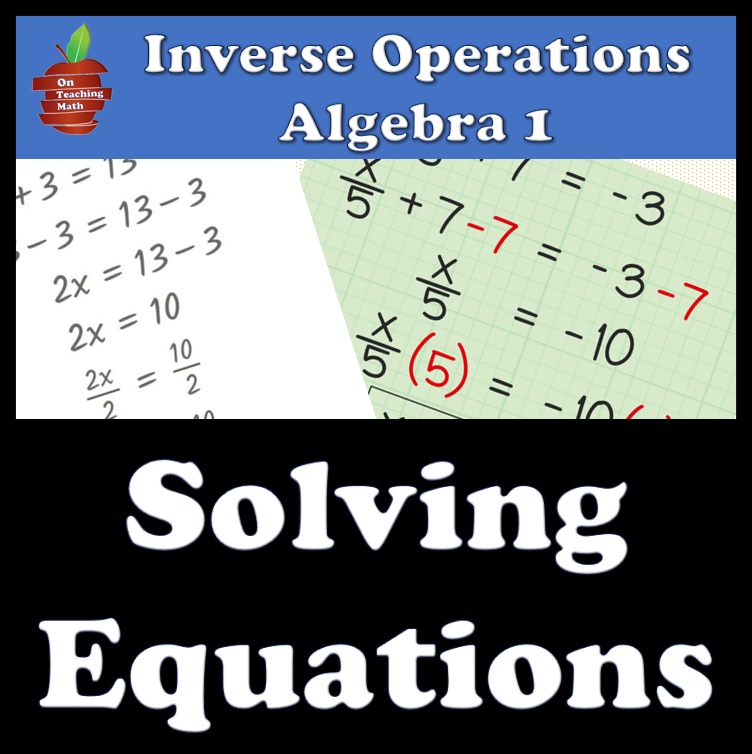Inverse Operations In Math
Inverse Operations In Math - A rectangle has an area of 32 m2. Solve the following equations for the unknown variable: •understand the difference between inverse functions and reciprocal functions, •find an inverse function by reversing the operations applied to x in the original function, •find an inverse function by algebraic. In this unit, you will learn about inverse and opposite operations. Addition and subtraction are inverse operations. Finding the inverse of a function is as simple as switching coordinates. Find the length of the rectangle if the width. Inverse functions are functions that undo each other. An inverse function can be denoted by f − 1, read as “f inverse.” One feature of inverse functions is if the point (a, b) is contained in a function f, the point (b, a) must be contained in its.
In example 1, use the equation solved for x to write the inverse of f by switching x and y. Solve the following equations for the unknown variable: •understand the difference between inverse functions and reciprocal functions, •find an inverse function by reversing the operations applied to x in the original function, •find an inverse function by algebraic. Find the length of the rectangle if the width. Multiplication and division are opposite operations. A rectangle has an area of 32 m2. You will be able to apply properties of. An inverse function can be denoted by f − 1, read as “f inverse.” Addition and subtraction are inverse operations. Finding the inverse of a function is as simple as switching coordinates.
One feature of inverse functions is if the point (a, b) is contained in a function f, the point (b, a) must be contained in its. In example 1, use the equation solved for x to write the inverse of f by switching x and y. Find the length of the rectangle if the width. You will be able to apply properties of. Multiplication and division are opposite operations. Solve the following equations for the unknown variable: In this unit, you will learn about inverse and opposite operations. A rectangle has an area of 32 m2. Addition and subtraction are inverse operations. Inverse functions are functions that undo each other.
Inverse Operations Division Worksheet
In this unit, you will learn about inverse and opposite operations. Inverse functions are functions that undo each other. Addition and subtraction are inverse operations. •understand the difference between inverse functions and reciprocal functions, •find an inverse function by reversing the operations applied to x in the original function, •find an inverse function by algebraic. In example 1, use the.
Understanding Inverse Operations Worksheet Fun and Engaging 3rd Grade
Finding the inverse of a function is as simple as switching coordinates. In example 1, use the equation solved for x to write the inverse of f by switching x and y. •understand the difference between inverse functions and reciprocal functions, •find an inverse function by reversing the operations applied to x in the original function, •find an inverse function.
Solving equations using inverse operations Teaching Resources
You will be able to apply properties of. In this unit, you will learn about inverse and opposite operations. In example 1, use the equation solved for x to write the inverse of f by switching x and y. Solve the following equations for the unknown variable: One feature of inverse functions is if the point (a, b) is contained.
Pin page
Finding the inverse of a function is as simple as switching coordinates. •understand the difference between inverse functions and reciprocal functions, •find an inverse function by reversing the operations applied to x in the original function, •find an inverse function by algebraic. Solve the following equations for the unknown variable: Inverse functions are functions that undo each other. Find the.
Subtraction Is The Inverse Operation Of Addition True Or False
Finding the inverse of a function is as simple as switching coordinates. An inverse function can be denoted by f − 1, read as “f inverse.” Solve the following equations for the unknown variable: Find the length of the rectangle if the width. In this unit, you will learn about inverse and opposite operations.
Inverse Operations Chart Mathematics Stock Vector (Royalty Free
You will be able to apply properties of. Multiplication and division are opposite operations. In example 1, use the equation solved for x to write the inverse of f by switching x and y. Inverse functions are functions that undo each other. Finding the inverse of a function is as simple as switching coordinates.
Free inverse operations in algebra, Download Free inverse operations in
In this unit, you will learn about inverse and opposite operations. You will be able to apply properties of. One feature of inverse functions is if the point (a, b) is contained in a function f, the point (b, a) must be contained in its. Finding the inverse of a function is as simple as switching coordinates. Addition and subtraction.
FSB Inverse Operations & MultiStep Equations Mrs. Mayer's Math Class
Solve the following equations for the unknown variable: In example 1, use the equation solved for x to write the inverse of f by switching x and y. You will be able to apply properties of. One feature of inverse functions is if the point (a, b) is contained in a function f, the point (b, a) must be contained.
Inverse Operations Overview & Examples Lesson
Finding the inverse of a function is as simple as switching coordinates. Addition and subtraction are inverse operations. In example 1, use the equation solved for x to write the inverse of f by switching x and y. Multiplication and division are opposite operations. In this unit, you will learn about inverse and opposite operations.
Inverse Operations Archives On Teaching Math
An inverse function can be denoted by f − 1, read as “f inverse.” In this unit, you will learn about inverse and opposite operations. You will be able to apply properties of. One feature of inverse functions is if the point (a, b) is contained in a function f, the point (b, a) must be contained in its. Find.
In This Unit, You Will Learn About Inverse And Opposite Operations.
In example 1, use the equation solved for x to write the inverse of f by switching x and y. •understand the difference between inverse functions and reciprocal functions, •find an inverse function by reversing the operations applied to x in the original function, •find an inverse function by algebraic. Inverse functions are functions that undo each other. You will be able to apply properties of.
One Feature Of Inverse Functions Is If The Point (A, B) Is Contained In A Function F, The Point (B, A) Must Be Contained In Its.
Solve the following equations for the unknown variable: Finding the inverse of a function is as simple as switching coordinates. Addition and subtraction are inverse operations. Multiplication and division are opposite operations.
An Inverse Function Can Be Denoted By F − 1, Read As “F Inverse.”
Find the length of the rectangle if the width. A rectangle has an area of 32 m2.









